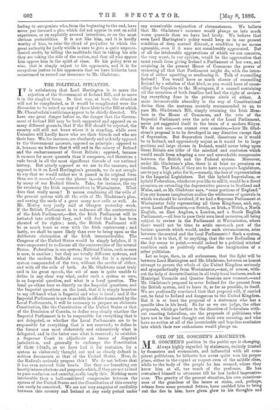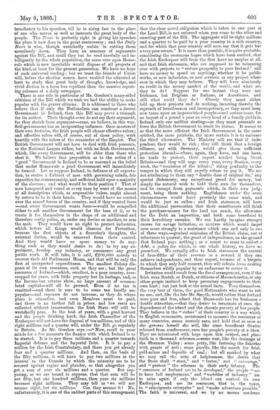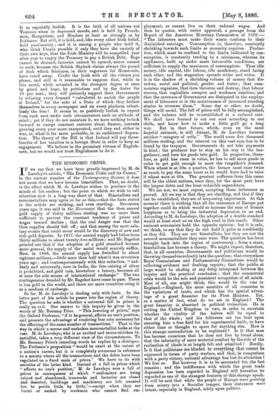ONE OF MR. GOSCHEN'S ARGUMENTS.
MR. GOSCHEN'S position in the public eye is changing. Always highly regarded by statesmen, entirely trusted by financiers and economists, and influential with all com- petent politicians, he hitherto has never quite won his proper place, either in the regard or respect even of the middle class, while to the body of the people he has seemed, where they knew him at all, too much of the professor. He has restrained himself in utterance till he has lacked impressive- ness. The gravity of the present situation, his own conscious- ness of the grandeur of the issues at stake, and, perhaps, release from some personal fetters, have enabled him to bring out the fire in him, have given glow to his thoughts and trenchancy to his speeches, till he is rising fast to the place of one who moves as well as instructs the great body of the people. The Times is perfectly right in giving his speeches the place it now does in the great controversy ; and the Daily News is wise, though wretchedly unfair, in cutting them mercilessly down. They form an armoury of arguments against the Bill, and could they but be read carefully and in- telligently by the whole population, the mass vote upon Home- rule which is now inevitable would dispose of all projects of the kind, at least for the present generation. We have no hope of such universal reading ; but we trust the friends of Union will, before the election comes, have enabled the educated at least to study that great body of thought, knowledge, and vivid diction in a form less repellent than the massive report- ing columns of a daily newspaper.
There is one side in particular of Mr. Goschen's many-sided criticism of the Bill which we wish we had the ability to make popular with the graver citizens. It is addressed to those who believe that if only the Nationalists can construct a decent. Government in Ireland, then this Bill may prove a triumph for its author. Their thought—we do not say their argument, for they shrink from argument—runs, we believe, in this way. Self-government has an invigorating influence. Once masters of their own destinies, the Irish people will choose effective rulers ; and effective rulers will, of course, out of sheer policy, work heartily with the rulers of the remainder of the Empire. The British Government will not have to deal with Irish peasants, or the National League either, but with an Irish Government, which, like every Government, will be abler than those who elect it. We believe that proposition as to the action of a " good " Government in Ireland to be as unsound as the belief that under Home-rule a good Government will immediately be formed. Let us suppose Ireland, in defiance of all expecta- tion, to evolve a Cabinet of men with governing minds, fair capacities for statesmanship, and sufficient hold upon a majority of the electors ; and what would be their position ? That of men hampered and vexed at every turn by want of the means of all descriptions which, as responsible rulers, ought almost by nature to be in their hands. They would have no control over the armed forces of the country, and if they wanted force —and every Government wants force—would be compelled either to ask another Government for the loan of it, or to create it for themselves in the shape of an additional and therefore costly police, or, under one device or another, to arm the mob. They would have no right to protect industries, which before all things would clamour for Protection, because the first objects of a financier's thoughts, the external duties, would be removed from their control. And they would have no spare money to do any- thing such as they would desire to do ; to try any ex- periment, develop any industry, or commence any great public work. It will take, it is said, £200,000 merely to recover their old Parliament House, and that will be only the first of unexpected expenditures. The smallest Colony dis- poses of its own resources, such as they are ; but the great resources of Ireland—which, recollect, is a poor country, over- cropped for years, with little property but its herbage, and, as the Income-tax returns show, no large amount of accumu- lated capital—will all be pawned. Even if no tax is remitted—and there is sure to be some tax locally un- popular—and expenses do not increase, as they do where place is attractive, and even Members must be paid, and there is no further fall in prices, and low rents are collected without insurrection, the Irish State will still be wretchedly poor. In the best of years, with a good harvest and the people drinking hard, the Irish Chancellor of the Exchequer will not have the disposal of ten millions, and of this eight millions and a quarter will, under the Bill, go regularly to Britain. As Mr. Goschen says :—" Now, recall to your minds for a few moments the finance with which Ireland is to be started. It is to pay three millions and a quarter towards Imperial defence and the Imperial Debt. It is to pay a million for the Irish Constabulary, and there you get already four and a quarter millions. And then, on the basis of the fifty millions, it will have to pay two millions as the interest to the Consols by which the minority are to be secured against rapine and plunder, so that altogether you get a sum of over six millions and a quarter. But sup- posing, as we are bound to suppose, that that sum will be not fifty, but one hundred raillionsr, then your Six millions becomes eight millions. They may tell we will not assume eight, but six millions.' Can they assume it? No, unfortunately, it is one of the saddest parts of this arrangement that the clear moral obligation which is taken in one part of the Land Bill, is not enforced when you come to the other and enacting part of the Bill. The aggregate will be eight millions and a quarter to be paid by a poor country to a rich country, and for which that poor country will soon say that it gets but every poor return." It is more than possible, it is quite probable, considering the enormous hopes which have been excited, that the Irish Exchequer will from the first have no surplus at all, and that Irish statesmen, who are supposed to be brimming over with projects to "restore prosperity to poor Ireland,' will have no money to spend on anything, whether it be public works, or new industries, or new services, or any project what- ever in which they may believe. They will have absolutely no credit in the money market of the world, and what are- they to do ? Suppose for one instant they were not Irishmen, but Belgians, or Italians, or Americans, and still what could they do V Clearly they must either fold up their projects and do nothing, incurring thereby the reproach of heartlessness and incompetency, or they must heap new taxes upon an impoverished people—and serious taxes, for an impost of a pound a year on every head of a family yields in Ireland only one million sterling—or they must persuade or force the British Government to remit its claims. It seems to us that the more efficient the Irish Government is, the more spirited, the more patriotic, the more certain it is to embrace the third alternative. The Ministry will see that if inde- pendent, they would be rich ; they will think that a foreign alliance, say with Germany, would give them sufficient protection abroad—where, again, they have, and can have, no trade to protect, their export market being Great Britain—and they will urge every year, every Session, every week, the "remission of the tribute," rising gradually to the temper in which they will angrily refuse to pay it. We are not attributing to them any "double dose of original sin," any special dishonesty, any exceptional greed for money, but simply the natural wish to hold their own for themselves, and be exempt from payments which, in their own judg- ment, bring them nothing. Englishmen under the same circumstances would have precisely the same wish, and would be just as sullen; and Irish statesmen will have the additional provocation that their constituents will think the purchase-money for the land too much, the allowance for the Debt an imposition and both sums beneficial to their hereditary enemies. We can hardly imagine stronger causes for savage irritation, or motives which would impel men more strongly to a resistance which can end only in one of three ways,—gradual remission of the British claim, out of reluctance to quarrel ; the grant of independence, on the ground that Ireland pays nothing ; or a resort to arms to collect a debt, a policy for which, in our whole history, we have no precedent. We actually offer to Irish statesmen the control of four-fifths of their revenue as a reward if they can achieve independence, and then expect, because of a bargain to which they only half consent, they will refrain from making themselves wildly popular by an endeavour to secure it.
Irritation would result from the fiscal arrangement, even if the Irish were Scotch, or Dutch, or citizens of Massachusetts, or any other people inclined to keep pecuniary engagements to their own hurt ; but just look at the actual facts. They themselves, the very best of them, the good Nationalists who want to rob no one, and, like the late Mr. Smyth, would rather that Ireland were poor and free, admit that Home-rule has for Irishmen a double attraction,—that they desire to terminate at once the dependence of the island and the chronic poverty of her people. They believe in the " riches " of their country in a way which to English economists, accustomed to measure the resources of many countries seems scarcely sane, and hold that as soon as she governs herself she will, like some beneficent Genius released from confinement, cure her people's poverty at a blew. They are intoxicated with hope upon this subject, and place faith in a thousand schemes,--frome vast, like the drainage of the Shannon Valley ; some petty, like fostering the fisheries with grants of nets; some puerile, like the search for Irish gold-mines and deposits of coal; but all marked by what we may call the note of helplessness, the desire thit the State shall "start," and "foster," and "encourage," and " protect " the schemes in their early infancy. The "resources of Ireland are to be developed," the people "are to have full employment," and "Tarietter of industry" am to arise again, if only the island= can control its own Exchequer, and use its resources; that is, the taxes, to "reinvigorate enterprise" and "make adventure possible." The faith is universal, and we by no means condemn
it as especially foolish. It is the faith of all nations not Teutonic when in depressed moods, and is held by French- men, Hungarians, and Hindoos at least as strongly as by Irishmen. But still, it is held, and, like every other Irish belief, held passionately ; and it is among a people who hold it, who think Utopia possible if only they have the custody of their own keys, that the Irish Ministry will be compelled year after year to empty the Treasury to pay a British Debt. Bogs cannot be drained, factories cannot be opened, mines cannot be sunk, because the British Shylock claims always the pound of flesh which Irishmen, in their eagerness for Home-rule, hare voted away. Credit the Irish with all the virtues you please, and still is it reasonable to suppose that, while in this mood, while actuated in the strongest degree at once by greed and hope, by patriotism and by the desire for 10 per cent., they will patiently support their Government in refusing every demand "calculated to enrich the people of Ireland," for the sake of a State of which they declare themselves in every newspaper and on every platform relent- lessly the foes ? It seems to us positively foolish to expect from such men under such circumstances such an attitude of mind ; yet if they do not maintain it, we have nothing to look forward to except constant contests about finance, contests growing every year more exasperated, until they end either in war, or, what is far more probable, in an embittered Separa- tion. The theory of the Bill is that Ireland will pay three- fourths of her taxation to a foreign State in order to keep an engagement. We believe in the pecuniary virtues of English- men, but we would not trust Englishmen to do it.
















































 Previous page
Previous page